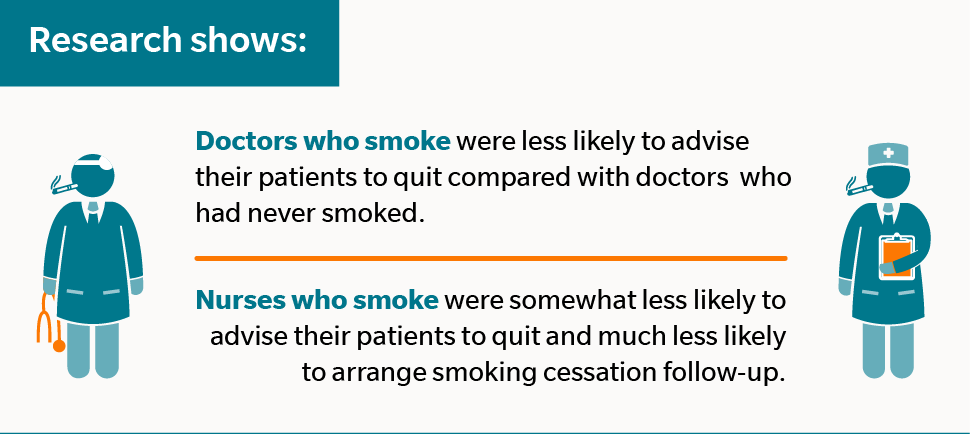Doctors and nurses who smoke can affect more than your organization’s healthcare costs; they can influence the quality of care for patients, too.
Healthcare professionals are some of the most influential employees for a clinic, hospital, or health care system. They impact everything from the work environment to patient satisfaction and behavior.
Having healthcare professionals ask their patients about tobacco use, advise tobacco users to quit, and refer to cessation resources—the AAR model of care—has long been known to be an effective way to help people stop using tobacco products.
But if those healthcare providers also use tobacco themselves, they may be less likely to recommend treatment to help patients quit.
This matters for many reasons, and is especially important if your organization is focused on value-based care, where improving patient outcomes is critical.
Nurses and doctors who smoke are less likely to promote cessation
About 15% of healthcare workers use tobacco, which is lower than the national average. Stress, peer and social influence, and socioeconomic status and education have been cited as 3 main factors influencing smoking rates specifically among nurses.
As health promoters, doctors and nurses who smoke may be inhibited without even realizing it. A meta-analysis suggested that doctors who smoke were less likely to advise their patients to quit compared with those who had never smoked. Similarly, nurses who smoke were somewhat less likely to advise their patients to quit and much less likely to arrange smoking cessation follow-up.
Impact of healthcare workers in helping patients quit smoking
As a trusted source of health information, nurses and doctors can play a key role in influencing patient behavior.
In fact, even 3 minutes of counseling on the topic of quitting can be effective!
For example, nurse-led interventions for smoking cessation among patients can increase the chance of successful quitting. The main barrier in achieving that goal is the nurses’ own smoking behavior.
This makes it even more critical for healthcare facilities to invest in their own staff’s cessation efforts.
Expert and discreet support for healthcare workers
It is well documented that quitting smoking significantly improves health outcomes, including reduced risk of coronary heart disease and risk of disease and death from stroke. And for patients, even not smoking on the morning of surgery can have health benefits.
To help your healthcare staff quit tobacco (and subsequently help your patients quit, too), it’s critical to offer a cessation program that meets tobacco users where they are. This means providing easy access support anytime, anywhere, and in the ways that work best for your people. Health professionals who smoke, for example, might feel additional stigma or shame around smoking, so providing help privately is essential.
Another factor specific to your population is the long and demanding hours, and the need to provide a flexible solution. Features like live chat support are important, which allow for short, focused and discrete counseling support, compared to phone or in-person support. Likewise, having quit medication delivered right to the participant’s home is another important feature to remove barriers to access.
EX Program partners with healthcare organizations nationwide to address the needs of employees and patients through an easy-access, evidence-based program. We provide:
- Convenient and discreet synchronous support from tobacco treatment experts via live chat.
- Quit medication delivered right to the participant’s home after chatting with a tobacco treatment expert.
- 24/7 social support from peers in our thriving EX Community.
- Dynamic text messaging support to help overcome cravings, relapse, stress, and more.
Contact EX Program to see a demo of our digital health program for tobacco addiction today, so we can work together to help your healthcare workers—and patients—live healthier lives.






